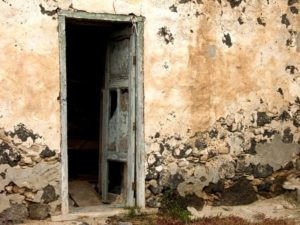Old Doors
in Thoughtful Thursdays on October 10, 2017
I have a confession…no, it’s not time for another Confession of a Terrible Stay Home Mom…although it has been a while since I’ve done one of those. I have to confess that when the idea came to me for this little project about the Reformation, I honestly thought it was going to be much, much easier. I’m a bit of a history buff, and church history is right up my alley. However, this assignment is proving to be more challenging than I anticipated.
Over the past couple of weeks, we’ve stared at the business end of Closed Doors and fought with Broken Doors. This week we are going to look at Old Doors.
Old Doors are unique. Most of the time they are warped and damaged in some way. As I am working toward a metaphorical picture for my project, I’ll tell you about my Old Door.
I am blessed enough to have been part of a five-generation family. I have long and healthy bloodlines. My great-grandmother passed down to me her cast-iron skillet…actually, I took it from her house after she died, brought it to my house, and stuck it in a cabinet, where I left it for years. I would occasionally see it sitting forlornly in my cabinet, as I rummaged around it, looking for other things…always passing over it…even picking it up, only to move it out of the way to reach my intended object. Through the years, it became more and more damaged, even rusting with the disuse, and mistreatment it was being shown at my hands. Why keep it?
Hold that thought.
This week, we are talking about Old Doors…actually OLD THINGS…doors just work with my theme. Last week, when we left Luther, he had nailed his 95 Theses, or 95 things he felt were broken, and wanted to discuss with the church on the castle door at Wittenberg. This week, I am going to try and explain why that was such a BIG deal, and I’m using my grandmother’s cast-iron skillet as an object lesson to help get my point across. Luther took aim at the selling of indulgences to release people from purgatory after they died. That was his major beef with the church. In preparation for this post, I spent some time with his 95, and over and over and over again, he kept going back to that point. He wanted people to understand that forgiveness was available to everyone who believed…period.
#37. Any true Christian, whether living or dead, participates in all the blessings of Christ and his Church, and this is granted by God, even without indulgence letters. (emphasis mine)
Here’s the rub for most people, everyone, and I do mean EVERYONE was Catholic. The teachings of the church (purgatory, indulgences to be released from purgatory) were ingrained from infancy. These practices, these teachings…traditions, if you will, held very special and emotional connections in people’s hearts and lives. It was familiar. Everybody wanted to go to heaven, and the teachings of the time said, you had to make a pit stop in purgatory first. Your time there depended on good behavior or how deep your pockets were. Martin Luther questioned that. All of that.
What Luther was proposing was unfamiliar. He took what was known, comfortable, and safe, and turned all of it inside out; all while completely and thoroughly insulting the Pope at the highest level:
#82 Why does the pope not empty purgatory for the sake of holy love and the dire need of the souls that are there if he redeems an infinite number of souls for the sake of miserable money…?
In effect, Luther was calling out the Pope for only wanting money for the indulgences and taking advantage of the people who were clinging to the promise of eternal redemption. Ouch. Luther was looking at the Old Doors of the church’s way of doing things. He found himself asking, should they continue conducting business as usual simply because that’s they way it’s always been done or should things change?
You know, I often wondered why I didn’t throw out that skillet. I never used it. It only took up precious space in my cabinet. That skillet had to be close to 100 years old. Was it any good?
A couple of years ago, my parents came to visit. My dad happens to be a master chef. He was rooting around in my kitchen and found my sorely neglected antique skillet. After a lengthy lecture about taking care of things that are precious to me and some significant TLC, he restored my old and battered skillet.
We are halfway through our series. Luther’s 95 Theses represented things that were precious to him…things that were broken and old and required some significant TLC. Just like my skillet some of the top layers needed to be removed. That sometimes happens with old things. It is a painful process. But, old is not always bad or useless. I used my old, yet restored skillet last night.
What Old Door do you have in your life? Is there something preventing you from seeing things clearly? Do you need to remove the damaged top layer in order to see things better? Is your door truly old and damaged? Or is it old with charm and character? Think about that this week.
Hang with me as next week we look at Sticky Doors.
-Dallas

